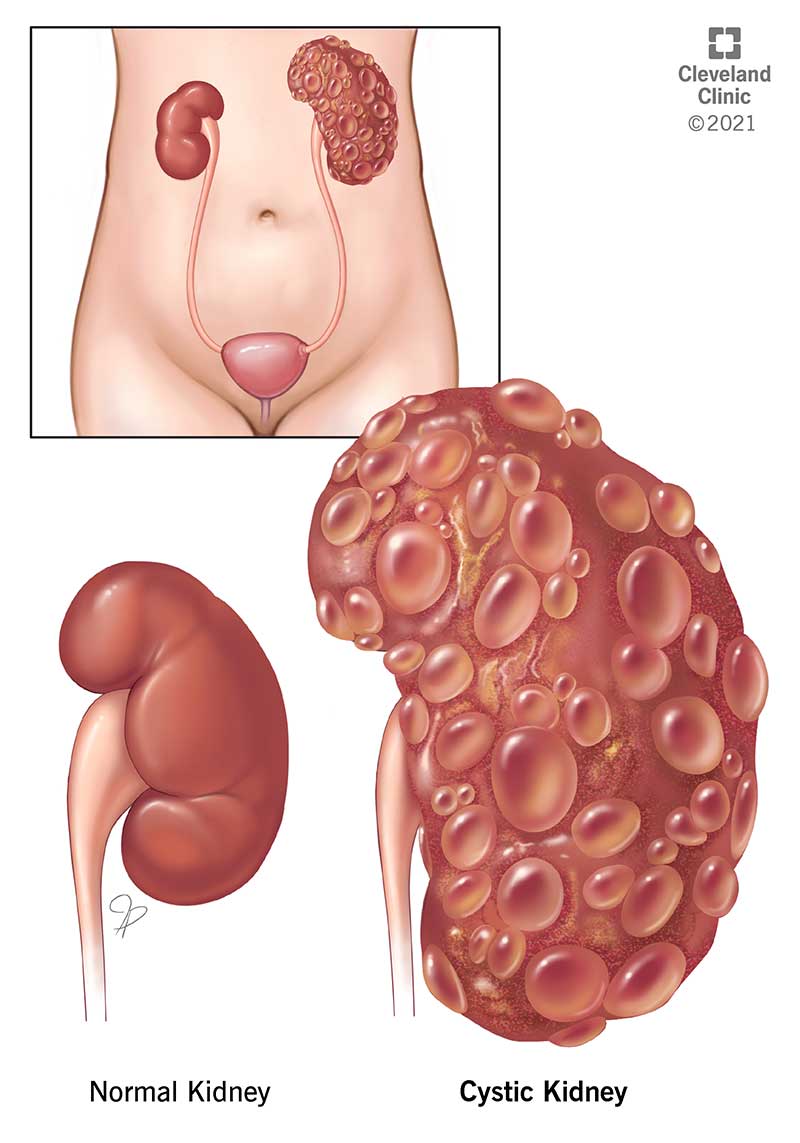Which of These Describes Polycystic Kidney Disease
In addition to the kidneys PKD1 polycystic kidney disease 1 expression is normally widespread in other adult tissues including epithelial and nonepithelial cell types 614182930 39. PKD is a group of two genetic disorders that affects the kidneys and cause the formation of multiple fluid-filled cysts of various sizes.

Chronic Kidney Disease Facts Polycystic Kidney Disease Kidney Disease Kidney Disease Recipes
What is Polycystic Kidney Disease.

. A study has described genetic changes in patients with the most common form of hereditary kidney. Which of the following statement describes the developmental defect that leads to end-stage renal disease for patients with polycystic kidney disease. Polycystic kidney disease is an inherited disorder in which fluid-filled sacs or cysts develop in the kidneys.
There are actually two different kinds. Anatomy and Physiology Ch. Polycystic renal dysplasia is a lethal malformation when it is bilateral.
Describe how polycystic kidney disease affects normal kidney function. Since the intact kidneys can compensate for the loss of glomerular filtration in ADPKD patients renal insufficiency usually remains undetected until almost the fourth decade of life. The diagnosis of ADPKD is based on family history and ultrasonographic evaluation.
More than 200 different PKD1 polycystic kidney disease 1 mutations have been described most of which are deletion-insertion frameshift or nonsense mutations. Clusters of fluid-filled sacs called cysts develop in the kidneys and interfere with their ability to filter waste products from the blood. Polycystic Kidney disease-Autosomal dominant.
THIS SET IS OFTEN IN FOLDERS WITH. ARPKD Nephronopthisis NPHP NPHP variants Other genetic disorders This lecture will concentrate only on the inherited forms of polycystic kidney disease an not urinary obstruction as a cause for kidney disease. Polycystic kidney disease PCKD is the most common hereditary cause of end-stage renal disease the complications of which may prevent the.
Encourage Judy to ask questions and discuss fears of diagnosis. 1 These cysts progressively enlarge with age as kidney function gradually declines. Autosomal dominant polycystic kidney disease ADPKD is one of the most common genetic diseases with a reported prevalence of 1400 to 11000.
Out of these cookies the cookies that are categorized as necessary are stored on your browser as they are essential for the working of basic functionalities of the website. These biamniotic monoplacental twins were delivered prematurely at 33 weeks of amenorrhoea. Which of these describes polycystic kidney disease.
Describe the location and the type of pain you are having. We also use third-party cookies that help us analyze and understand how you use this website. -Inherited Cystic Renal Disease.
Polycystic kidney disease also known as PKD is a genetic disorder that involves the development of cysts within and around the kidneys. Enlarged kidney with urine-filled blister-like sacs. All F statistics reported polycystic kidneys cpk polycystic kidney disease here can be converted to lod scores by the formula LOD 5 0217 3 F pcy and juvenile cystic kidney disease jck Fry et for comparison to other significance criteria eg Lander and Schork al 1985.
Enlarged kidney with urine-filled blisterlike sacs Sexually transmitted infections STIs are primarily infections of the reproductive tracts but may also cause urinary tract infections. Takahashi et al 1991. Iakoubova et al 1994.
Unlike the usually harmless simple kidney cysts that can form in the kidneys later in life PKD cysts can change the shape of. The growth of cysts causes the kidneys to become enlarged and can lead to kidney failure. These sacs cysts tend to multiply in number and grow in size over time often leading to potentially fatal kidney failure.
ADPKD and Medullary cystic disease-Autosomal Recessive. Autosomal dominant polycystic kidney disease ADPKD is characterized by slow but progressive enlargement of the kidneys with renal failure occurring by the fifth to sixth decade of life1 The disease occurs in approximately 1800 to 11000 people and accounts for 25 of all cases of end-stage renal disease12 Clinically ADPKD presents over the course of. Polycystic kidney disease is an inherited disorder in which small closed liquid-filled sacs develop in the tissue of the feline kidney.
-Polycystic Kidney Disease-African American Ethnicity. Polycystic kidney disease PKD is a genetic disorder that causes many fluid-filled cysts to grow in your kidneys. Based on these diagnoses which nursing intervention should be included in Judys plan of care.
As these cysts grow they squeeze and destroy normal kidney tissue. As an adult with polycystic kidney disease Alex is likely to have. Autosomal dominant polycystic kidney disease ADPKD is a hereditary disorder of the kidneys characterized by markedly enlarged kidneys with extensive cyst formation throughout.
The authors report a rare case of polycystic dysplasia observed in both foetuses of a twin pregnancy one of whom survived despite bilateral polycystic kidney disease. Which of these describes polycystic kidney disease. Renal tubules swell into fluid filled sacs.
The renal tubules become larger due to increased urine production. Polycystic kidney disease is a disorder that affects the kidneys and other organs. Alex a 24-year-old man has polycystic kidney disease.
Doctors advise him to have a kidney transplant as his condition could worsen and he could face chronic kidney failure. Which of these is a nitrogenous waste produced by the liver and poorly reabsorbed by the kidney. Research describes the diversity of genetic changes that cause inherited kidney disease in Ireland.
The renal tubules migrate from the medulla to the cortex of the kidney. Autosomal recessive polycystic kidney disease ARPKD a rare version that develops in fetuses and babies and autosomal dominant polycystic kidney disease ADPKD which is much more common and.

Cystic Kidney Disease Types Causes Symptoms Treatment

Kidney Function Detox Kidney Disease Symptoms Kidney Disease Awareness Kidney Disease
No comments for "Which of These Describes Polycystic Kidney Disease"
Post a Comment